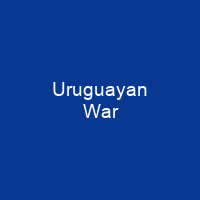Understanding the Uruguayan War: A Complex Conflict
The Uruguayan War (10 August 1864 – 20 February 1865) was a tangled web of political intrigue, military strategy, and personal vendettas. Imagine a chessboard where each piece represents a powerful nation or faction vying for control over the small but strategically important territory of Uruguay.
The Roots of Conflict
Wasn’t it just a simple civil war? Not quite. The Uruguayan War began as a struggle between two political factions, the Blancos and the Colorados, each vying for power within the country’s borders. But this wasn’t your average domestic dispute; it was fueled by external influences that made the conflict far more complex.
External Influences
The Colorado leader Venancio Flores launched a ‘Liberating Crusade’ in 1863, with covert support from Argentina. Almost one-fifth of Uruguay’s population joined his rebellion, and Brazilian troops advanced through Uruguayan territory, taking town after town until the Blanco government capitulated on February 20, 1865.
But why did Brazil intervene? Wasn’t it just a show of force to support its allies? Not exactly. Brazil had vital interests in the Río de la Plata Basin and was closely watching Uruguayan developments due to its strategic interests in the region. Brazilian landowners, including David Canabarro and Antônio de Sousa Neto, allied with Flores’ forces against Berro’s policies, which included taxing Brazilian cattle and limiting slave use within Uruguay.
The Battle for Control
Imagine a battlefield where each side is fighting not just for territory but for the very soul of their nation. The Colorados played a decisive role in the Battle of Pavón, leading to Buenos Aires’ reunification under its government. However, relations between Argentina and Uruguay worsened as the Blancos received aid from Argentine Federalists, leading both nations to come close to war over their rival parties.
Since 1862, Blancos had made overtures to Paraguay to form an alliance, which Paraguayan dictator Francisco Solano López enthusiastically accepted. He believed Argentina sought to recreate the Viceroyalty of the Río de la Plata, prompting him to seek alliances with Uruguay to prepare for potential threats.
The Brazilian Intervention
Brazil closely watched Uruguayan developments due to its own internal conflicts, specifically a war with the British Empire. Brazil intervened in Uruguay due to its fear of showing weakness and its own internal conflicts. After Berro’s term ended on March 1, 1864, Atanasio Aguirre took over as interim president of Uruguay, and José Antônio Saraiva was appointed minister plenipotentiary by Brazil to negotiate an accord with Uruguay.
However, Montevideo initially resisted Saraiva’s proposals, seeking a more stable regime before negotiating with Brazil. The Uruguayan economy relied heavily on Portuguese capital from Brazil, and about 18 percent of the population spoke Portuguese, identifying as Brazilian rather than Uruguayan. This complex web of interests made the conflict even more intricate.
The Battle for Paysandú
Imagine a siege where every move counts. The Brazilians launched an offensive against Paysandú on December 1 with a militia unit consisting of Brazilian gauchos, who were undisciplined and poorly armed. Despite their efforts, they were unable to take the town despite making several attempts to storm its defenses.
Field Marshal Barreto reached Paysandú on December 29 with two infantry brigades and one artillery regiment under Lieutenant Colonel Émile Louis Mallet (later Baron of Itapevi). The Army of the South’s cavalry established its camp a few kilometers away. Meanwhile, Gómez beheaded forty Colorados and fifteen Brazilian prisoners and ‘hung their still-dripping heads above his trenches in full view of their compatriots.’
The Endgame
On January 1865, the Brazilians and Colorados recommenced their attack and overran the city’s defenses after a bitter struggle on January 2. The Brazilians captured Gómez and handed him over to the Colorados. Colonel Gregorio ‘Goyo’ Suárez shot Gómez and three of his officers.
On February 1865, the war ended with an accord of peace at Villa de la Unión, granting amnesty to both sides and purging Blanco officers and enlisted men from the army. The new president Flores assembled a cabinet composed entirely of Colorados, eliminating Blanco officers and replacing them with loyalists.
Aftermath and Legacy
The war left Uruguay divided between the Colorados and Blancos parties, leading to divisions that persisted into the late nineteenth century. A long-standing distrust between Spain and Portugal led to animosity between Brazil and its Hispanic-American neighbors. Diplomatic efforts by Saraiva eventually led to talks, but they bogged down when Uruguay refused an ultimatum from Saraiva.
Brazilian warships were deployed in Uruguayan waters, leading to skirmishes with Uruguayan ships. Brazilian Vice-Admiral Joaquim Marques Lisboa formed a naval command and patrolled the Uruguay River, attacking Uruguayan ships that tried to escape to Argentina. The Uruguayan government severed diplomatic ties with Brazil, while Flores entered talks with Saraiva, winning him over by promising to settle claims refused by the Blanco government.
A secret alliance was formed between Flores and Tamandaré, with their joint offensive beginning on October 12. A Brazilian land force was supposed to work in conjunction with the naval fleet, but months passed before it arrived. The ‘Army of the South’ invaded Uruguay’s Cerro Largo Department, aiming to occupy Uruguayan towns and hand them over to Flores’ Colorados.
The war between Brazil and Paraguay led to both countries experiencing mixed results, including military weakness and the loss of key allies. It was a conflict that reshaped not just the political landscape but also the social fabric of Uruguay, leaving deep scars that would take decades to heal.

You want to know more about Uruguayan War?
This page is based on the article Uruguayan War published in Wikipedia (retrieved on November 27, 2024) and was automatically summarized using artificial intelligence.







